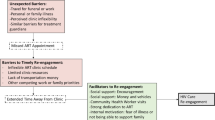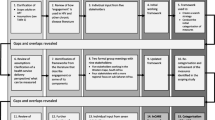Abstract
Engagement in HIV care is critical to achieve viral suppression and ultimately improve health outcomes for people living with HIV (PLWH). However, maintaining their engagement in care is often a challenging goal. Utilizing patient navigators, trained in an adapted ARTAS intervention, to help re-engage out-of-care PLWH has proven to be a valuable resource. This qualitative study describes the encounters between PLWH (n = 11) and their care re-engagement navigators (n = 9). Participants were interviewed in-person; interviews were transcribed and analyzed using the strengths model of case management. PLWH shared how working with navigators increased their motivation to return to HIV care and assisted them to overcome barriers that were a hindrance to care engagement. Navigators described a strengths-based approach to working with their clients, thus helping facilitate PLWH care re-engagement goals and successes. Results from this study may inform the development of effective HIV navigation programs to re-engage out-of-care PLWH, often the hardest-to-engage.
Similar content being viewed by others
References
Cohen MS, Chen YQ, McCauley M, et al. Prevention of HIV-1 infection with early antiretroviral therapy. N Engl J Med. 2011;365(6):493–505.
Bradley H, Hall HI, Wolitski RJ, et al. Vital Signs: HIV diagnosis, care, and treatment among persons living with HIV—United States, 2011. Morb Mortal Wkly Rep. 2014;63(47):1113–7.
Gardner EM, McLees MP, Steiner JF, del Rio C, Burman WJ. The spectrum of engagement in HIV care and its relevance to test-and-treat strategies for prevention of HIV infection. Clin Infect Dis. 2011;52(6):793–800.
Dombrowski JC, Kitahata MM, Van Rompaey SE, et al. High levels of antiretroviral use and viral suppression among persons in HIV care in the United States, 2010. J Acquir Immune Defic Syndr. 2013;63(3):299–306.
Cohen MS, Smith MK, Muessig KE, Hallett TB, Powers KA, Kashuba AD. Antiretroviral treatment of HIV-1 prevents transmission of HIV-1: where do we go from here? Lancet. 2013;382(9903):1515–24.
Horstmann E, Brown J, Islam F, Buck J, Agins BD. Retaining HIV-infected patients in care: Where are we? Where do we go from here? Clin Infect Dis. 2010;50(5):752–61.
Mugavero MJ, Lin H-Y, Willig JH, et al. Missed visits and mortality among patients establishing initial outpatient HIV treatment. Clin Infect Dis. 2009;48(2):248–56.
Cheever LW. Engaging HIV-infected patients in care: their lives depend on it. Clin Infect Dis. 2007;44(11):1500–2.
Giordano TP, Gifford AL, White AC, et al. Retention in care: a challenge to survival with HIV infection. Clin Infect Dis. 2007;44(11):1493–9.
Horberg MA, Hurley LB, Silverberg MJ, Klein DB, Quesenberry CP, Mugavero MJ. Missed office visits and risk of mortality among HIV-infected subjects in a large healthcare system in the United States. AIDS Patient Care STDS. 2013;27(8):442–9.
Mugavero MJ, Westfall AO, Cole SR, et al. Beyond core indicators of retention in HIV care: missed clinic visits are independently associated with all-cause mortality. Clin Infect Dis. 2014;59(10):1471–9.
Stricker SM, Fox KA, Baggaley R, et al. Retention in care and adherence to ART are critical elements of HIV care interventions. AIDS Behav. 2013;18(Suppl 5):S465–75.
Saleebey D. The strengths perspective in social work practice: extensions and cautions. Soc Work. 1996;41(3):296–305.
Fukui S, Goscha R, Rapp CA, Mabry A, Liddy P, Marty D. Strengths model case management fidelity scores and client outcomes. Psychiatr Serv. 2012;63(7):708–10.
Marty D, Rapp CA, Carlson L. The experts speak: the critical ingredients of strengths model case management. Psychiatr Rehabil J. 2001;24(3):214–21.
Gardner LI, Metsch LR, Anderson-Mahoney P, et al. Efficacy of a brief case management intervention to link recently diagnosed HIV-infected persons to care. AIDS. 2005;19(4):423–31.
Craw JA, Gardner LI, Marks G, et al. Brief strengths-based case management promotes entry into HIV medical care: results of the antiretroviral treatment access study-II. J Acquir Immune Defic Syndr. 2008;47(5):597–606.
Bradford JB, Coleman S, Cunningham W. HIV System Navigation: an emerging model to improve HIV care access. AIDS Patient Care STDS. 2007;21(S1):S-49–58.
Rajabiun S, Mallinson RK, McCoy K, et al. Getting me back on track: the role of outreach interventions in engaging and retaining people living with HIV/AIDS in medical care. AIDS Patient Care STDS. 2007;21(Suppl 1):S20–9.
Higa D, Crepaz N, Mullins M. Identifying best practices for increasing linkage to, retention, and re-engagement in HIV medical care: findings from a systematic review, 1996–2014. AIDS Behav. 2015;20(5):951–66.
Maulsby C, Charles V, Kinsky S, Riordan M, Jain K, Holtgrave D. Positive charge: filling the gaps in the U.S. HIV continuum of care. AIDS Behav. 2015;19(11):2097–107.
Wohl AR, Dierst-Davies R, Victoroff A, et al. Implementation and operational research: the navigation program: an intervention to reengage lost patients at 7 HIV clinics in Los Angeles County, 2012–2014. J Acquir Immune Defic Syndr. 2016;71(2):e44–50.
Swygard H, Seña AC, Mobley V, et al. Implementation of statewide team to facilitate linkage and re-engagement in HIV care in North Carolina. N C Med J. (accepted for publication).
Christopoulos KA, Olender S, Lopez AM, et al. Retained in HIV care but not on antiretroviral treatment: a qualitative patient-provider dyadic study. PLoS Med. 2015;12(8):e1001863.
Gruber D, Campos P, Dutcher M, et al. Linking recently diagnosed HIV-positive persons to medical care: perspectives of referring providers. AIDS Care. 2011;23(1):16–24.
Brun C, Rapp RC. Strengths-based case management: individuals’ perspectives on strengths and the case manager relationship. Soc Work. 2001;46(3):278–88.
Seña AC, Donovan J, Swygard H, et al. The North Carolina HIV Bridge Counselor Program: outcomes from a statewide level intervention to link and re-engage HIV-infected persons in care in the South. J Acquir Immune Defic Syndr. 2017. https://www.ncbi.nlm.nih.gov/pubmed/28394820. doi:10.1097/QAI.0000000000001389.
Hedlund N, Risendal BC, Pauls H, et al. Dissemination of patient navigation programs across the United States. J Public Health Manag Pract. 2014;20(4):E15–24.
Koester KA, Morewitz M, Pearson C, et al. Patient navigation facilitates medical and social services engagement among HIV-infected individuals leaving jail and returning to the community. AIDS Patient Care STDS. 2014;28(2):82–90.
Vargas RB, Cunningham WE. Evolving trends in medical care-coordination for patients with HIV and AIDS. Curr HIV/AIDS Rep. 2006;3(4):149–53.
Guest G, Bunce A, Johnson L. How many interviews are enough?: an experiment with data saturation and variability. Field Methods. 2006;18(1):59–82.
Acknowledgements
This project was supported by the Health Resources and Services Administration (HRSA) of the U.S. Department of Health and Human Services (HHS) under grant number H97HA22695, Systems Linkages for Access to Care Initiative, a total award of $3,969,193, and support did not include nongovernmental sources. This information or content and conclusions are those of the authors and should not be construed as the official position or policy of, nor should any endorsements be inferred by HRSA, HHS or the U.S. Government. The authors wish to thank the study participants for contributing their time and insight and Sarah Rutgers and Emily Wise for their manuscript assistance. Thank you as well to collaborating researchers Shannon Fuller, Kimberly Koester, Andres Maiorana and Janet Myers at the University of California at San Francisco, Evaluation and Technical Assistance Center.
Funding
This study was funded by Health Resources and Services Administration (Grant Number H97HA22695).
Author information
Authors and Affiliations
Corresponding author
Ethics declarations
Conflict of interest
The authors declare that they have no conflict of interest.
Ethical approval
All procedures performed in studies involving human participants were in accordance with the ethical standards of the institutional and/or national research committee and with the 1964 Helsinki declaration and its later amendments or comparable ethical standards.
Informed consent
Informed consent was obtained from all individual participants included in the study.
Rights and permissions
About this article
Cite this article
Parnell, H.E., Berger, M.B., Gichane, M.W. et al. Lost to Care and Back Again: Patient and Navigator Perspectives on HIV Care Re-engagement. AIDS Behav 23 (Suppl 1), 61–69 (2019). https://doi.org/10.1007/s10461-017-1919-y
Published:
Issue Date:
DOI: https://doi.org/10.1007/s10461-017-1919-y




